When I thought about NPR covering the topic of diversity in technology from the perspective of African Americans I thought long and hard about what my contribution would be to the conversation. I thought about what misinformation has made me most angry in my journey through technology and what I could do to prevent others from being misguided by the wrathful deities that tell us “math is hard, go play Call of Duty”.
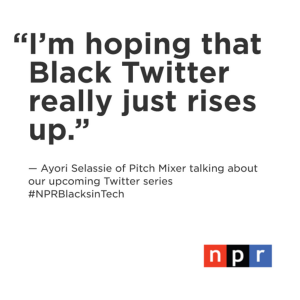
I know that parents face challenges preparing and supporting their children in mathregardless of race, which is why there are many resources targeted toward parents. The challenges in learning math impact student readiness and excitement for learning other concepts directly related to science and engineering technology. I knew in my heart that education was the right topic for me to tackle along with my fellow peers in the #NPRBlacksinTech series, and that I needed to tackle it in a way normal people would understand.

Monologic forms are the hallmark of individual competence and accountability, and are one of the primary measures of expertise in learning assessment
Lies About Learning:
Let me begin by saying that I was fortunate to be born to a mother who made math a high priority in our home. I can clearly recall the sadness of missing the first few games in the NBA final of Jordan’s Chicago Bulls vs Clyde Drexler’s Portland Trail Blazers because I failed a math test AND said “I hate math!” to my mother. She didn’t punish me so much for failing the test as much as for saying I hated math. If only then I knew that I just learned things differently I never would have felt, or said those words. A few years later I was fortunate to have the opportunity to shift from the general didactic way of learning (teacher lecturing the student) to a monological (self-guided and exploratory) way of learning by the time I was high school age. Let me explain. I was homeschooled, this came with benefits as well as unique challenges but for me the benefits (of homeschooling) far outweighed the challenges. Let me tell you why. At the most critical phase of developing my own personal learning process I was allowed the freedom to discover how and why I most loved learning. Through my love of learning cool new things I realized that math was really powerful and had incredible applications such as 3D modeling which I learned (via online tutorials of 3D Studio Max) when I was 16. Loving learning has been my secret weapon ever since.
Fostering a love of learning is key to engaging the self-motivation to overcome challenges one faces when a subject is difficult to learn. When people are enabled to learn in the best way for them they begin to love learning. The frictionless experience of learning something you love to learn becomes addictive. Joyfully addictive. Unfortunately most students in traditional education rarely experience this feeling because standard form factored curricula can trigger the feeling of being a square peg forced into a round hole, students feel the pain of having to learn a specific style of learning that they may never fully embrace AND whatever concept the learning is supposed to transfer. It is the epitome of painful learning through “Weapons of Mass Instruction”. No wonder people say math is hard or that they hate learning new (hard) things!
Some experts believe that we falls into one or more category of learning styles which can range from visual (learning from pictures or illustrated concepts), to auditory (hearing information), to tactile (interacting with physical projects) to abstract conceptualization vs concrete experience and/or active experimentation vs reflective observation and any combination in between. Many people know their learning style instinctively, you’ll find yourself saying things like “show me” if you are concrete example or visual learner for example. The challenge is when institutions (whether it is work, or school or church) refuse to support someone in their learning style and instead buy into the didactic method of instruction that requires that we sit in tiny chairs for hours on end and listen to someone lecture us (and I’m going to make a terrible reference so you can see the power in this) as if we were children! No one, least of all children ought to be subjected to this as the basis of their existence unless it happens to be the best way that they learn (didactic learner).
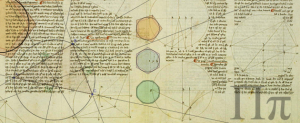 I find that the friends I tend to collect are all people who love learning, we don’t all learn the same way, but we all are passionate about discovering new stuff, testing it out, and doing something with what we learn. They’ve all overcome the institutions which attempted to force them into some specific grid and came out on the other side as empowered individuals with a clear sense of self and creativity. Yes, mathematicians and engineers are just as creative as artists and musicians. I would even challenge to say that math, science and engineering IS art. They are tools as powerful as paper, pen and paintbrush. Actually they are tools to craft and create other tools (works of art) to craft more art, whether it be a bridge, a tablet, global network to transfer data or the roof over your head. My friends and family helped me to see that I wasn’t weird, rather I was passionate and talented in something that was somewhat unordinary. Unordinary people become quite ordinary when they are are surrounded by other unordinary people. So people who geek out on math and science are totally normal! They’ve just discovered their own unique way rather than letting tradition misguide them.
I find that the friends I tend to collect are all people who love learning, we don’t all learn the same way, but we all are passionate about discovering new stuff, testing it out, and doing something with what we learn. They’ve all overcome the institutions which attempted to force them into some specific grid and came out on the other side as empowered individuals with a clear sense of self and creativity. Yes, mathematicians and engineers are just as creative as artists and musicians. I would even challenge to say that math, science and engineering IS art. They are tools as powerful as paper, pen and paintbrush. Actually they are tools to craft and create other tools (works of art) to craft more art, whether it be a bridge, a tablet, global network to transfer data or the roof over your head. My friends and family helped me to see that I wasn’t weird, rather I was passionate and talented in something that was somewhat unordinary. Unordinary people become quite ordinary when they are are surrounded by other unordinary people. So people who geek out on math and science are totally normal! They’ve just discovered their own unique way rather than letting tradition misguide them.
Lies About Math:
So really, I get mad when I hear people say “math is hard”. I now understand thoroughly why my mom whooped my… I mean, punished me for saying I hated math. Because WE ARE MATH. Every electron that fires through our nervous system from our brain to make our legs walk is made of math. The Xbox that you play Call of Duty on is made of math. The x-rays, sonograms, breathing systems, and heart monitors used in hospitals are all math. Everything you are grateful for right now is mathematical in some shape or form. You just didn’t realize it. And now that you do you are responsible for spreading the word far and wide.
If I’ve gotten through to you you might now be thinking “you’re right, I do love math, but it’s still hard as hell!”. If that is what you’re thinking it’s okay, I’ve got an answer for that too. Read on!

Like in Angry Birds, a weak foundation is easy to break down, math is just like that. Math is not hard, it's layered.
Education instruction isn’t all broken, but there is one specific area that makes me particularly angry. It’s loosely related to no child left behind and the forced graduation and promotion of students through the conveyor belt of institutionalized education. Math, like reading is a subject that people frequently say becomes increasingly difficult overtime. I disagree with that assertion. Math doesn’t get more difficult overtime. Math simply builds on top of previous concepts and if you are forced to move on prior to having a solid foundation, the learning becomes increasingly painful. It’s just like playing angry birds, if the foundation is weak, the game is easy. If the foundation is very strong you’ll be trying to figure out how to get pass the level for an hour or more.
Math generally begins with recognizing the concepts of letters, numbers, shapes and colors. Then we begin basic arithmetic, addition, subtraction, multiplication, division and a variant of division called fractions. If you don’t understand addition, subtraction gets harder. If you don’t understand addition, multiplication gets harder. If you don’t understand subtraction, division gets harder and so on and so forth. The point is, if students weren’t forced along before they are comfortable and fully grasping a concept, they would never think math was hard! I call this manufactured complication. Our culture of contest and competition has put our youth at a severe disadvantage because students are afraid to be left behind by their peers, yet if the students progress they will continue to struggle more and more in the future and their confidence is heavily affected. Arithmetic is really where the problems begin and students are forced to move along this conveyor belt before they are ready.
More affluent communities have discovered a lucrative method of counteracting the result of the ever moving conveyor belt, tutoring businesses have popped up at least since the 90s and make a killing in cash to supplement student education. Many of these businesses leverage either more ideal learning styles or drilling to nail the concepts deeper into the students. Sadly many in underserved communities do not have this luxury of further study. As a result students in the affluent communities move onto advanced subjects like trigonometry, calculus, computer programming, robotics and even game design enabling them to create and invent new products, while students in underserved communities are relegated to being consumers and shopping at walmart. This is all to say that if you are struggling in math you are not broken! The institutions are broken. Education is not broken, the process of schooling is broken.
Math in the Real World:
Inspiring and motivating students to pursue STEM (Science, Technology, Engineering and Math) is difficult when STEM is presented as an abstract concept. Not everyone wants to be a scientist yet you’d be hard fought to find a teenager who doesn’t want to make a design or build a house, a video game, a mobile app or earn a six figure salary. Can we put out some fresh carrots for these students please? Learning math concepts opens doors to doing incredible things and working in very lucrative (benjamins baby!) careers. And you don’t have to go as far as trig and calculus to do it even!
Someone is going to get mad at me for saying this but most programing uses basic algebra and statistics (see Combinatorics). Certainly the more math you learn the better off you are, but if a counselor ever tells you or your child that software programming is really hard and requires a lot of math they are selling you a load of crap. Programming involves some math, but trust me, most of it isn’t mindblowing. The majority of programmers are able to do their work and make six figure incomes without very complex math but how would a college counselor know this?
Lies About You:
If you have been forced along the conveyor belt of education and you feel perhaps you need reinforcement on some basic arithmetic, don’t be embarrassed. Fill in the gaps by watching tutorials on youtube, or kahn academy, or coursera, or take a community college class. Do whatever you need to fill the gap. If you have children, learn it with them! Do not be discouraged, your commitment to learn math will inspire others to do so as well. Can you imagine what it would feel like to not only increase your own ability and end up in a better paying career but to also know that you were the role model for someone else to do the same? It could affect entire families! Really, this is big stuff. Just do the math ;-). You can have an exponential impact and inspire others just by committing yourself to learning in the best way that you learn.
Lastly the greatest lesson in learning is to think. Think for yourself. Test it out. If you think you learn better in some specific way, double down on that method and see what happens. Become your own advocate and when you see things working advocate for others as well. Confidence is critically important to enabling us to chase our dreams and take risks. So be on your own cheerleading squad and join someone else’s cheering section as well, preferably a child and help them overcome the odds and build a strong foundation in math. And remember, it’s not hard because you love to learn.
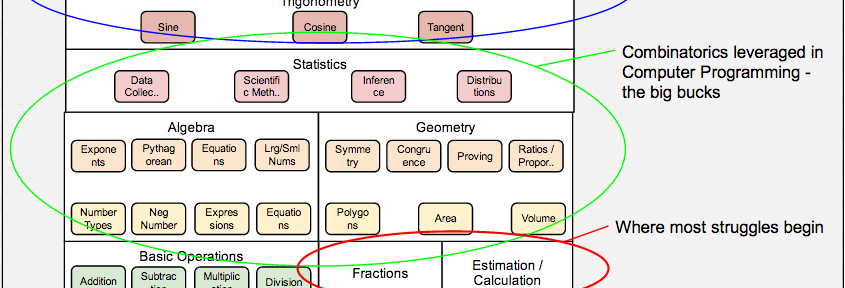
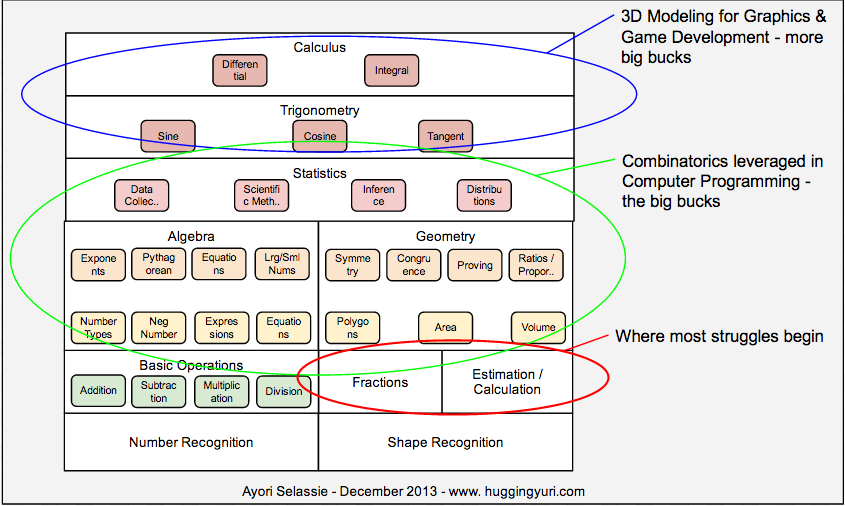
I can’t tell you how much this article speaks to me. I, like many others we’re crippled by the fact that I completely shut myself off from math from 6th grade on. Why 6th grade? Why was I in the honors math class to begin with? Why? Because I, like many others, was not born to hate math. I had one bad teacher who didn’t give a damn about teaching kids through barriers such as poor home support, and there is where I the link was broken. The image above that shows the where the disconnect lies in the foundation of mathematical development was where I shut down.
Fast forward to today. Although I am a financial professional, I still sometimes struggle in some of the most basic calculations; but, I am a financial professional because I am no longer afraid to tackle my fears and my weaknesses head on. I will overcome this and I will stop at nothing to make sure that future generations of young adults aren’t held back from realizing their full academic and professional potential because of the fear of math.
Just found you on Twitter and read this article. Brilliant. I am a new twitter follower and will be reading more of your work. I wish I could have had the benefit of homeschooling, your mom sounds like a wonderful source of support and guidance. You rock!